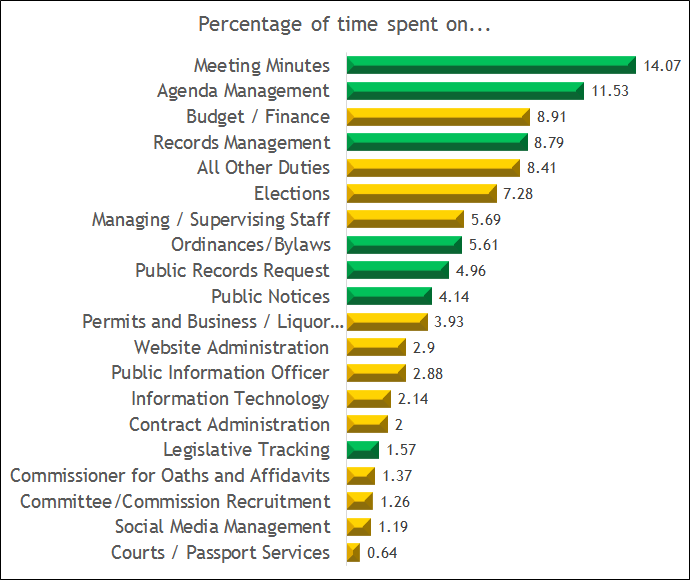The 3rd annual iCompass' Municipal Clerks survey was done to help provide better visibility into the key trends and challenges in this key local government position. Whether you are a City Manager or Clerk, these findings could change the way you see your organization, and help better inform budgetary decisions for improvements in the Clerk's Department. You'll find some of the key results below.


How Much Time Do Clerks Spend on Legislative Duties?
iCompass' 3rd Annual Municipal Clerks Survey found Clerks dedicate 51% of their work-hours to legislative duties, such as meeting minutes, agenda management, records management and legislative tracking. But the big takeaway is how this 20 hours per a week is being spent. Despite all the time and effort spent, local governments, particularly Clerks and City Managers, still face a serious risk of lawsuit, the loss of public trust and media scrutiny. And all because of a lack of transparency and not enough public access to records.Why Are Local Governments at Risk?
The results show an overwhelming majority (73%) of local governments in North America still rely on a paper-based process for agenda management. This means countless hours are spent compiling documents the general public and the media can't easily access. While a lack of efficiency for budget-strapped local governments will always be a concern, the risks go far deeper. State/Federal legislation continues to amp up the pressure on local governments of all sizes to deliver meeting and records related information online in a timely manner. But in many cases legislation falls short of growing expectations from the public, the media and some councils that agendas, minutes, records should all be available in an easily consumable format online. Without an automated system for the creation and publishing of agenda packets, not to mention tracking of upcoming items, local governments will struggle meeting this standard without hiring additional staff or dropping services levels elsewhere. A paper-based system presents a number of risks that can impact the job security of top-ranking local government officials, as well as expose organizations to the potential for lawsuits and litigation.
How Agenda Packets Are Created
Surprisingly 73% of local governments still rely on paper-based processes for agenda management. The survey also found that local governments currently fit into one of the following three scenarios for the agenda management process.
Implications for Clerks
Behind every local government that uses a manual approach to agenda management, is a Clerk devoting half their work-week (15-20 hours) to agenda management. From compiling signatures to having police officers deliver packets, the list of inefficient tasks in a paper-based system is lengthy. An inability to make last-minute changes to an agenda can delay legislation, and leave less time for Council to absorb information. Ultimately, a paper-based system limits the Clerk's ability to make an impact. Instead of focusing on new projects to deliver better services, they will be spending almost half of their job doing time-consuming manual tasks.Key Survey Takeaways
Clerks are having to jump hurdle after hurdle to deliver a high standard of service for their citizens. Paper-based approaches to agenda and records management are taking up hours of valuable time and still do not result in the level of transparency necessary for local government. What's more, these challenges are being compounded by increasingly tighter local government budgets. The good news is there are ways to reduce the time needed for legislative duties, enabling local governments to achieve more with less. The even better news is that an automated solution doesn't have to be expensive. Local governments can increase efficiency without compromising budget by leveraging iCompass, a Diligent brand.
Media Highlights
Environmental, social and governance (ESG) issues have become more complex and multifaceted than ever before. At the same time, ESG continues to ascend on board and leadership agendas.
In this buyer’s guide, we explore what a market-leading ESG solution should look like and highlight the key areas organisations should be prioritising as they embark on their search.




